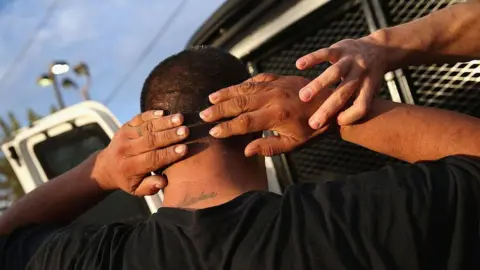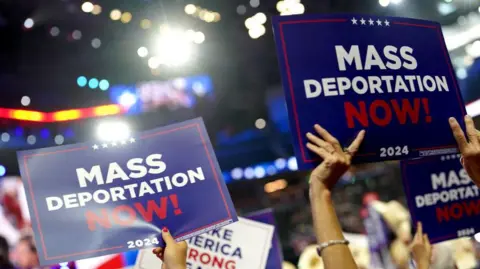Immigrants hope Trump will only deport ‘criminals’

 Getty Images
Getty ImagesGabriela entered the United States more than two decades ago, panting under a pile of corn stalks in the boot of a smuggler’s car.
Now a housekeeper in Maryland, the Bolivian is one of at least 13 million undocumented immigrants living in the US – a term that includes those who enter the US illegally, overstay their visas or have protected status to avoid deportation.
Across the US, immigrants like Gabriela are debating what the Trump administration’s vow to deport more people could mean for their future.
In more than a dozen interviews, undocumented immigrants said it was a heated conversation in their communities, on WhatsApp groups and on social media.
Others, like Gabriela, believe it won’t affect them at all.
“I’m not afraid at all,” he said. “That’s for criminals to worry about. I pay my taxes, and I work.”
“In any case, I don’t have any official documents,” he added. “[So] how do they know about me?”
In an election campaign in which immigration has emerged as a major concern of American voters, Trump has often promised to deport immigrants en masse from American soil from his first day in office if he were to return to the presidency.
But nearly two weeks after his re-election victory, it remains unclear what these immigration enforcement actions will look like.
The president-elect has insisted that the cost will not be a problem, but experts have warned that his promises may face significant financial and operational challenges.
His newly appointed “border chief,” Tom Homan, said undocumented immigrants deemed national security or public safety threats would be a priority. And he suggested workplace raids — a practice abolished by the Biden administration — could return.
Speaking to Fox News on Saturday, the former acting director of Immigration and Customs Enforcement during the Trump administration challenged the notion that “those who enforce the law are the bad guys and those who break the law are the victims”.
“What member of Congress, what governor or what Mayor is against taking public safety threats out of their community?” he asked, adding that the new administration “will follow the authority that the American people gave to President Trump”.
US authorities deporting immigrants is nothing new. More than 1.5 million people have been deported under President Joe Biden, more than the millions who quickly turned their backs on the border during the violence of Covid-19.
During the eight years of Barack Obama’s administration – some called him the “deporter-in-chief” – nearly three million people were deported, with a focus on single Mexican men who could easily be deported from border states.
Trump’s promised plans, however, are much broader and more aggressive, including forcing operations in the US far from the border. Officials reportedly also considered using the National Guard and military aircraft to arrest and eventually deport people.
JD Vance, Trump’s running mate and incoming vice president, said deportations could “start” with a million people.
Still, some undocumented immigrants believe they will benefit from a Trump presidency instead of being deported.
“Most Latinos, those who could vote, did so because they thought it was him [Trump] it can improve the economy. That would be great for us as well,” said Carlos, an undocumented Mexican who lives in New York City. His son is an American citizen.
According to the American Immigration Council – a non-partisan organization that conducts research and advocates for reform of the US immigration system – more than five million Americans were born to undocumented parents and have the protection of US citizenship.
Carlos says he’s “a little” worried about being swept up in an immigration raid. But those fears are tempered by the possibility of an improved economy under Trump and more jobs.
“Things may be tense in our communities right now, but worrying is not the solution,” he said. “The best thing you can do is stay out of trouble and don’t commit crimes.”
 Getty Images
Getty ImagesThere are many others who do not share this hope, and live in fear.
Among them is California resident Eric Bautista, nicknamed “Dreamer”, a beneficiary of a long-standing program that protects from deportation those brought to the US illegally as children.
At 29, Mr Bautista has only fleeting memories of life in Mexico, the country he was born in and left at the age of seven.
For the past four years, he has taught US history to high school students – including details of how waves of immigrants from Italy, Ireland, China, Japan and Mexico settled in the country, and often faced xenophobia.
“I don’t think I’ve ever felt this way, even after more than 20 years of being here,” Mr Bautista told the BBC. “It feels like we’re in a time of change, a new wave of nativism like the one I’m teaching about.
“It’s just a future of fear and uncertainty for us.”
Lawyers and legal experts said there is no guarantee that undocumented immigrants with criminal convictions will not be caught in the trap of deportation.
Aaron Reichlin-Melnick, director of policy at the American Council on Immigration, said he foresaw an uproar in “collateral detention” — a term used in the first Trump administration to describe immigrants swept up in enforcement action, though it may not have been the first. target.
“Let’s say they are after someone with a criminal record, that person lives in a house with four others [undocumented] people,” he said. “We’ve seen with the Trump administration for the first time, they’re going to arrest those people.”
In a recent interview with CBS, the BBC’s US partner, Homan was asked about a hypothetical situation in which a grandmother was caught in the “target” of law enforcement following criminals.
When asked if he would be fired, Homan replied “it depends”.
“Let the judge decide,” he said. “We will remove the people dismissed by the judge.”
The arrests and possible removal of such arrests would mark a major departure from the Biden administration, which has focused on threats to public safety and deporting people quickly after they are apprehended at the border.
Although Homan recently dismissed suggestions that there could be a “mass sweep of neighborhoods” or the establishment of large detention camps, the prices of companies that may be involved in the construction of detention centers have increased nearly 90 percent since the election. They include publicly traded prison companies GEO Group and CoreCivic.
Undocumented immigrants are employed throughout the US economy – from agricultural fields to warehouses and construction sites.
Mr Reichlin-Melnick said targeting these workplaces could lead to “indiscriminate” arrests.
“I don’t think that being a person without a criminal record is enough [who] you’re paying taxes and protecting anybody,” he said. “One of the first things Trump will do is remove key enforcement provisions from the Biden administration. And we have seen that if there are no priorities, they will easily follow whoever is directed at them. “
The possibility of being “easy prey” worries many immigrants – especially those from families with mixed legal statuses. Their biggest fear is to find themselves separated.
Brenda, a 37-year-old “Dreamer” originally from Mexico, Texas, is currently protected from deportation but her husband and mother are not.
Two of his children were born in the US and are American citizens.
Although Brenda told the BBC that she does not believe that “good people” would be the first victims of deportation, she cannot escape the thought that her husband may be sent back to Mexico.
“It is important for us to see our sons grow up,” he said. “It’s just that the thought of being separated leaves one in awe.”


Source link



